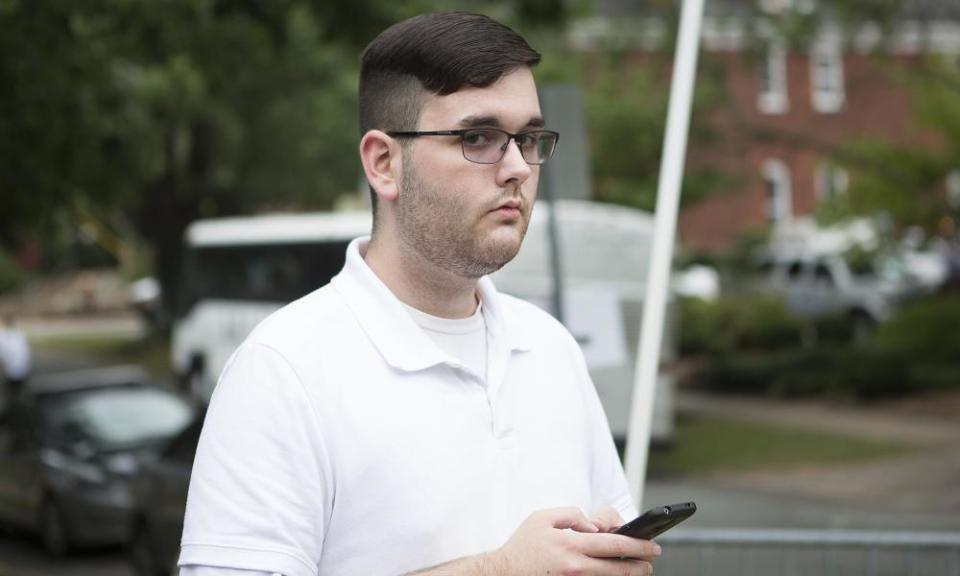Charlottesville suspect goes on trial for murder
James Alex Fields, 21, accused of killing Heather Heyer, 32
Many injured in incident following far-right rally in Virginia

The man who allegedly rammed a car into a crowd of protesters during a white supremacist rally in Charlottesville, Virginia, last year is set to go to trial on Monday for the murder of Heather Heyer.
Heyer, a 32-year-old paralegal, was one of the local residents who protested against neo-Nazi and white nationalist groups that descended on the quiet university town for a “Unite the Right” rally on 12 August 2017. Dozens of other protesters were injured, many seriously, in the alleged car attack.
James Alex Fields, a 21-year-old white man who was photographed marching with the neo-Nazi group Vanguard America, faces a first-degree murder charge, multiple charges of malicious wounding and assault and separate federal hate crime charges.
As a high school student in Ohio, Fields idolized Hitler and Nazism and his white supremacist views were a “known issue”, one of his teachers told reporters after the attack. His mother told the Associated Press she had known her son was traveling to Virginia to attend a rally, but had “thought it had something to do with Trump”.
Jury selection for the Charlottesville trial is scheduled to begin on Monday and last two to three days.
The trial comes at a time of rising global concern about the threat of white supremacist violence. The car attack came two months after a white man drove a van into a crowd of Muslims near a mosque in Finsbury Park in north London, leaving one man dead and 12 people injured. It happened 14 months after the West Yorkshire Labour MP Jo Cox was shot and stabbed to death by a man obsessed with Nazism and white supremacy.
Americans were recently confronted with what appeared to be a major white supremacist attack: the 27 October shooting at a synagogue in Pittsburgh, Pennsylvania, which left 11 people dead. Robert Bowers, the 46-year-old white man charged, appeared to have posted regularly on an extremist social network, accusing Jewish people of trying to bring “evil” Muslims and other “invaders” into the US, and suggesting white Americans and “Western Civilization” were “headed towards certain extinction”.
Donald Trump, who responded to the Charlottesville attack by arguing there were “very fine people” on both sides, sparked protests when he visited Pittsburgh. Demonstrators accused the president, whose rhetoric and policies have been praised by white supremacists, of emboldening a growing white nationalist movement.
“You yourself called the murderer evil but yesterday’s violence is the direct culmination of your influence,” members of Bend the Arc, a national Jewish organization, wrote in an open letter.
Trump’s “both sides” comments after Charlottesville prompted condemnation from Susan Bro, Heather Heyer’s mother, who said she would not speak to the president. “You can’t wash this one away by shaking my hand and saying, ‘I’m sorry,’” she said.
Local and federal law enforcement officials are also facing criticism, for what critics say is a politically motivated failure to adequately monitor and respond to white supremacist extremism, even as resources are poured into monitoring attacks inspired by Islamic State and other Islamist extremist groups.
The series of deadly attacks and a drumbeat of violent public protests and street brawls have put a spotlight on how white supremacist groups recruit and organize online, highlighting the ways in which Facebook, Twitter, YouTube and other companies have provided platforms for radicalization.
On the anniversary of the Charlottesville rally this summer, survivors of the car attack called on other Americans to do more to fight racism.
“We are responsible for this time in history,” Constance Young, 35, who was injured, told protesters at an anti-racism rally in Washington DC that attracted thousands. “If we don’t stand up and say, ‘Not here, not now, not any more’, this violence will keep happening on our watch.”

